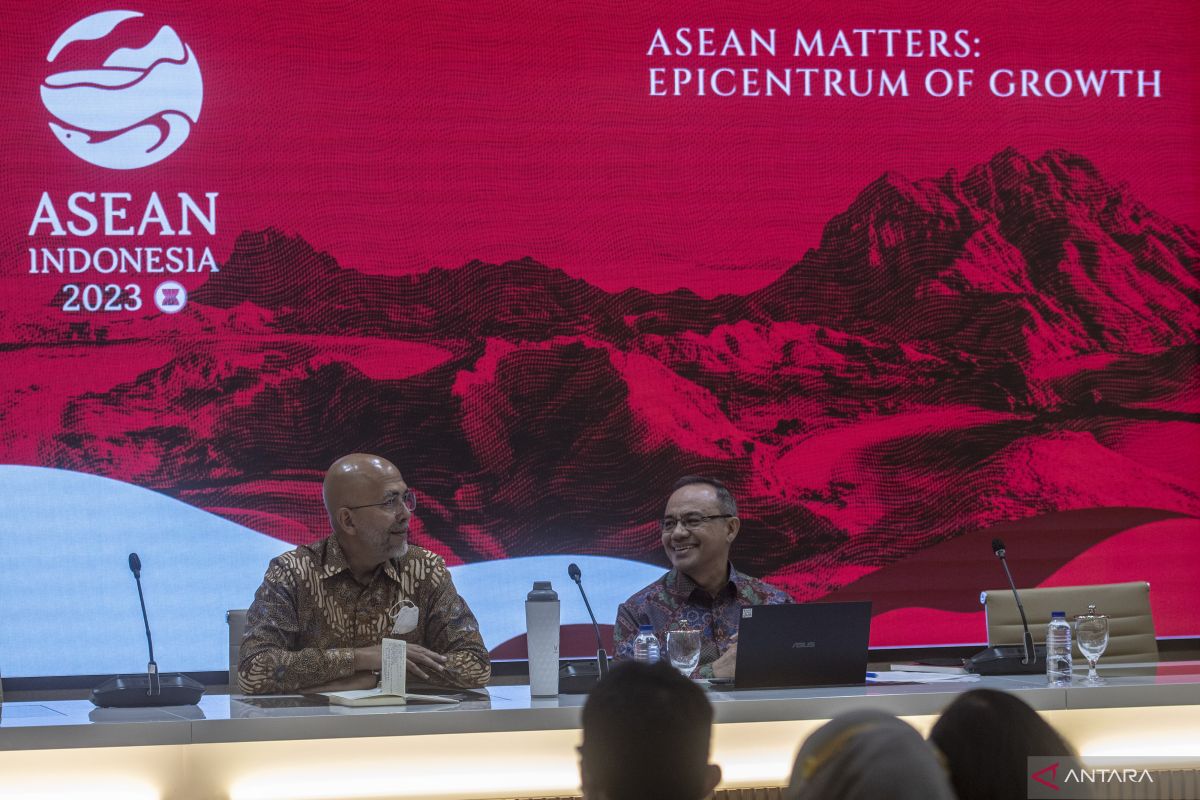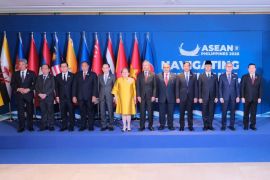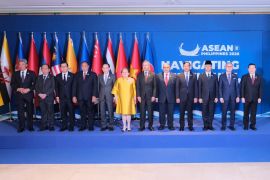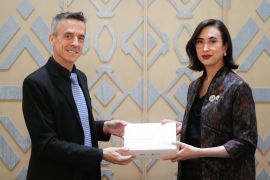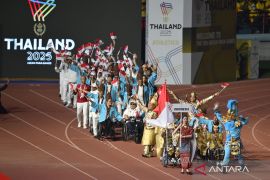Southeast Asia must be able to reaffirm its bargaining position in the world, as countries that are also actively involved in determining the world's geopolitical map, especially in promoting world peace to stop the current crisis.
After being hit by the COVID-19 pandemic, the economic recovery issue has become very important for all countries. Through its chairmanship in the ASEAN Summit this year, Indonesia aims to help ASEAN as the center of the world economy.
As the theme of Indonesia's ASEAN 2023 Chairmanship is "ASEAN Matters: Epicentrum of Growth," this year's ASEAN Summit will focus on strengthening the regional economy to grow in a fast, inclusive, and sustainable manner.
Indonesia's chairmanship will raise three priority issues in the economic sector -- economic recovery, digital economy, and sustainable development -- with reference to the main achievement targets that have been set.
Moreover, the meeting of Southeast Asian countries at the 2023 ASEAN Summit in Indonesia must discuss political and security cooperation in order to take concrete steps to increase the role of ASEAN member countries in world peace amid the Russia-Ukraine conflict and the turmoil of the cold war involving the allies of Russia and Europe.
The issue of world peace is also important at the ASEAN Summit, as efforts and strategies for joint economic recovery discussed in Southeast Asia will be disrupted when world geopolitics is still in turmoil.
In this year's chairmanship, Indonesia is expected to encourage the leaders of ASEAN countries to agree on a declaration or joint statement regarding efforts to promote world peace, to become a bridge for peace negotiations, or to force countries in conflict to make peace immediately; with the bargaining position of each country.
The spirit of togetherness among ASEAN countries, as stated in the text of the 1967 Bangkok Declaration, which is the initial formation of ASEAN, can become the main foundation in re-establishing ASEAN's dignity in the eyes of the world and promoting world peace.
ASEAN history
Talking about the mission to uphold the dignity of Southeast Asia countries on the world stage, of course, it is necessary to review the history of ASEAN.
The history of the founding of ASEAN began with the follow-up to the signing of the Bangkok Declaration on August 8, 1967, in Bangkok, Thailand.
At that time, five representatives of the state/government of Southeast Asian countries -- Indonesian Minister of Foreign Affairs Adam Malik, Deputy Prime Minister concurrently Minister of Defense and Minister of National Development of Malaysia Tun Abdul Razak, Minister of Foreign Affairs of the Philippines Narciso Ramos, Minister of Foreign Affairs of Singapore S. Rajaratnam, and Thailand's Minister of Foreign Affairs Thanat Khoman -- followed up the Joint Declaration by holding a meeting and signing the ASEAN Declaration or what is known as the Bangkok Declaration.
The contents of the Bangkok Declaration include: accelerating economic growth, social progress, and cultural development in the Southeast Asia region; enhancing regional peace and stability; increasing cooperation and mutual assistance for common interests in the economic, social, technical, scientific, and administrative fields; maintaining close cooperation among existing regional and international organizations; and enhancing cooperation to advance education, training, and research in the Southeast Asia region.
With the signing of the Bangkok Declaration, a regional organization named the Association of Southeast Asian Nations (ASEAN) was officially established, with the initial target to foster cooperation between member countries in order to accelerate economic growth, promote regional peace and stability, and form cooperation in various areas of common interest.
Although it has not specifically discussed the ASEAN's role in world peace, the Bangkok Declaration showed the roots of ASEAN's commitment to togetherness.
In the following years, ASEAN made various significant agendas in the political field, such as the Declaration of Peace, Free, and Neutral Zones signed in 1971 and the 1976 agreement on the Treaty of Friendship and Cooperation, which became the basis for ASEAN countries to live side by side in peace.
In the economic field, the Agreement on ASEAN Preferential Trading Arrangements (PTA) was successfully agreed upon and signed in Manila on February 24, 1977, which became the basis for adopting various instruments in trade liberalization.
In further developments, the Agreement on the Common Effective Preferential Tariff (CEPT) Scheme for the ASEAN Free Trade Area (AFTA) was successfully agreed in Singapore on January 28, 1992, which further encouraged other countries in Southeast Asia to join ASEAN members.
Along with various goals that have been achieved, five countries outside the initiating country also joined this organization:
1. Brunei Darussalam officially became the 6th member of ASEAN on January 7, 1984, through the Special Meeting of ASEAN Foreign Ministers (ASEAN Ministerial Meeting/AMM) in Jakarta, Indonesia.
2. Vietnam officially became the 7th member of ASEAN at the 28th ASEAN Foreign Ministers Meeting in Bandar Seri Begawan, Brunei Darussalam, July 29-30, 1995.
3. Laos and Myanmar officially became the 8th and 9th members of ASEAN at the 30th ASEAN Foreign Ministers' Meeting in Subang Jaya, Malaysia, July 23-28, 1997.
4. Cambodia officially became the 10th member of ASEAN in the Special Acceptance Ceremony on April 30, 1999, in Hanoi.
Regarding ASEAN membership, Timor Leste, which is geographically located in the Southeast Asian region, has also officially registered as a member of ASEAN in 2011. At the ASEAN Summit in Phnom Penh, Cambodia, in 2022, ASEAN country leaders agreed to recognize Timor Leste as the 11th member of ASEAN.
However, Timor Leste has not been a full member, so its presence at the 2023 ASEAN Summit in Indonesia will be as an observer country.
Bali Concord III
Over time, ASEAN has developed in accordance with the aspirations of its founders, to establish friendship and cooperation in creating a safe, peaceful, and prosperous region.
These ideas were realized, among other things, by the Bali Concord I agreement of 1976 in which ASEAN leaders agreed on a Program of Action that included cooperation in the political, economic, social, cultural and information fields, security, and improvement of ASEAN mechanisms.
The literal meaning of Concord is harmony. Therefore, the Bali Concord can be interpreted as an ASEAN agreement on harmony that was reached at the meeting in Bali.
ASEAN also agreed to form an integrated area in a community of Southeast Asia countries that is open, peaceful, stable and prosperous, cares for each other, and is bound together in a dynamic partnership in 2020 by ratifying the Bali Concord II at the 9th ASEAN Summit in Bali 2003 that agreed to establish the ASEAN Community.
Through the Bali Concord II, the ASEAN Leaders agreed that ASEAN must move forward towards an ASEAN Community consisting of three pillars: the ASEAN Political-Security Community Pillar, the ASEAN Economic Community Pillar, and the ASEAN Socio-Cultural Community Pillar.
The three pillars of the ASEAN Community are closely bound and mutually reinforcing to create everlasting peace, stability, and common prosperity. In this matter, Indonesia was the initiator of the formation of the ASEAN Political-Security Community and played an important role in the formulation of the other two pillars.
Furthermore, at the 19th ASEAN Summit in Bali on November 17-19, 2011, the Bali Concord III was ratified, in which ASEAN established itself to realize regional and global interests that were more peaceful, equal, democratic, and prosperous.
This Bali Concord III then strengthened ASEAN's position in the global community as an outward looking entity that actively provides solutions to global problems.
ASEAN's achievements in maintaining peace and stability in the region for more than four decades must be extended to the global level. What has been agreed upon in the Bali Concord III, should become a capital for a joint commitment to respond to current world problems.
ASEAN leaders must act decisively in promoting peace and also instilling the values of mutual cooperation and togetherness in Southeast Asia on the world stage.
The history of the formation of ASEAN and the number of agreements and commitments that have been achieved in several decades must continue to become the foundation, both in terms of the efforts to bring ASEAN into the center of the global economy and to make Southeast Asia countries as the caretakers of world peace.
Related news: Trade Ministry prepares 4 flagship events for ASEAN Chairmanship 2023
Related news: Indonesia, Malaysia agree to strengthen ASEAN
Editor: Rahmad Nasution
Copyright © ANTARA 2023
